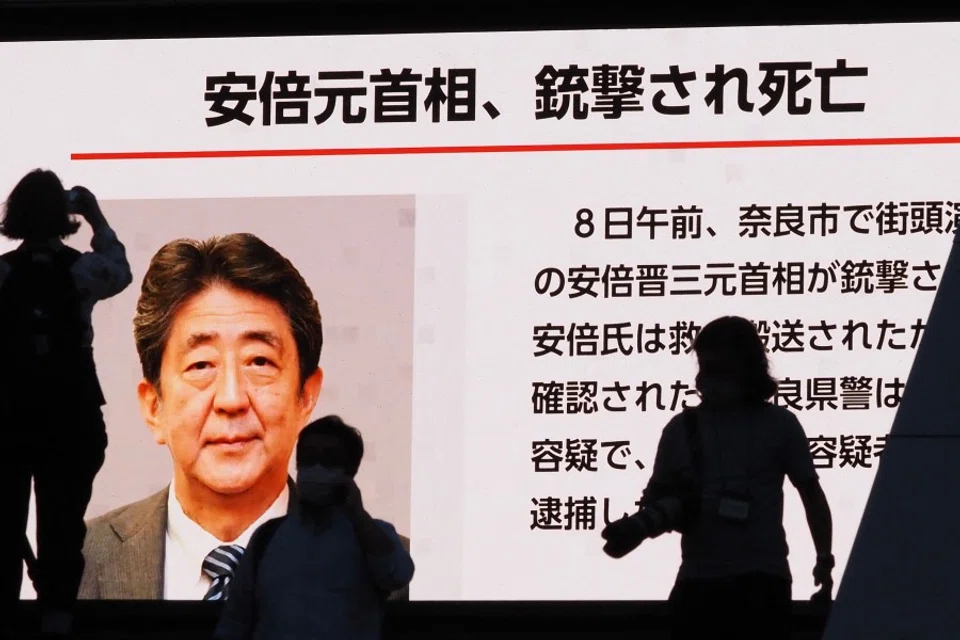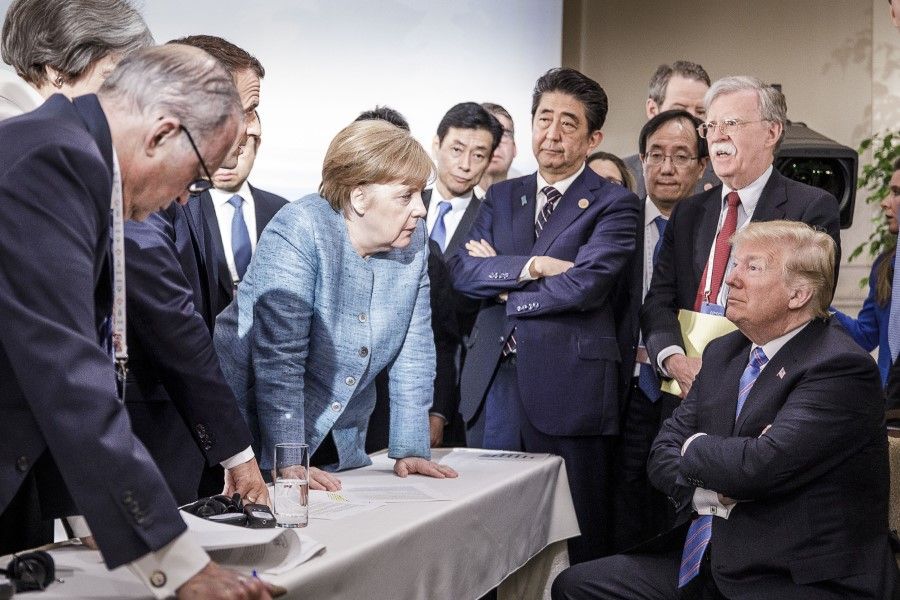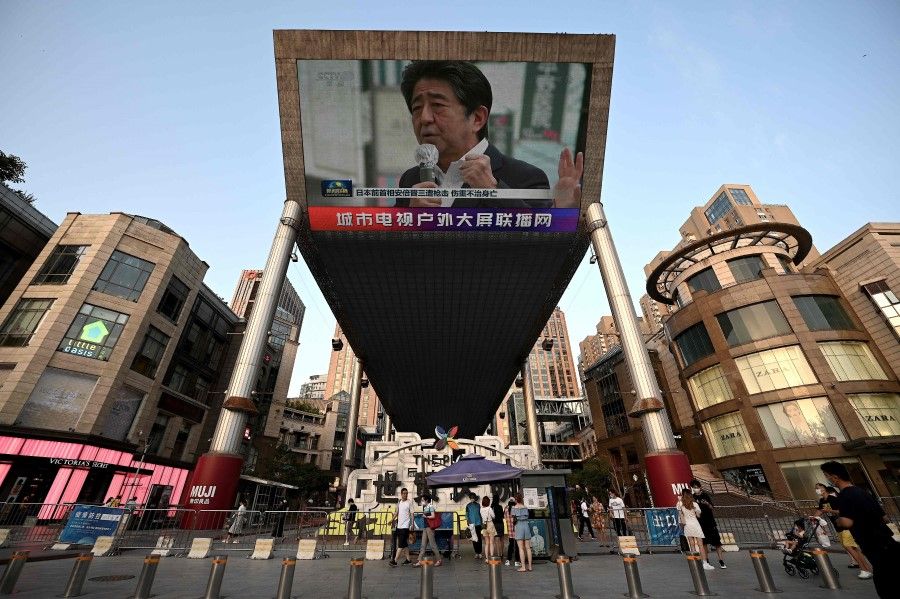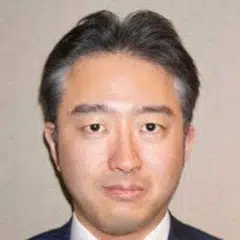Kishida will pick up the baton of Shinzo Abe's dream

A few days before Japan's triennial upper house election, former Prime Minister Shinzo Abe was shot dead. From the investigations so far, this was not an act of terrorism for political gain, but one of settling a personal grudge in the form of two bullets. Those two shots took the life of a 67-year-old politician who, having served as Japan's longest running postwar prime minister, was still very active on the political stage.
The upper house election went ahead without major disruptions, and Abe's passing does not seem to have had much impact on the vote totals of the ruling or opposition parties, though it may have had the unintended effect of demonstrating the resilience of Japanese democracy.
The late Abe served as prime minister for a year in 2006, and then returned to office at the end of 2012, ruling Japan for seven and a half years thereafter. While assessments of his economic policies are split, his period in office created enough stability to provide much needed breathing room for the Japanese economy, which had been languishing for over two decades after the economic bubble burst.
In expanding his geographical perception from Asia-Pacific to Indo-Pacific, and including the phrase "free and open"...Shinzo Abe revealed his true value as an idea broker.
In some respects, the long-term Abe administration led to instances of strong-arming the media and a spate of scandals involving close advisors and supporters. Combined with a growing divide between Japan's rich and poor, this led to social fragmentation and accelerated a climate of political confrontation.
Characteristics of Abe diplomacy
Even so, Abe's major accomplishments are in his diplomacy and security policies, and these are the areas that will be highlighted when history passes judgement on him in the future.

The most prominent characteristic of Abe diplomacy was the breadth of his worldview. The concept of a Free and Open Indo-Pacific (FOIP) was communicated to the world by the Abe administration part way through his use of the term, which was later used by the US, Europe and others. In expanding his geographical perception from Asia-Pacific to Indo-Pacific, and including the phrase "free and open" which, while perhaps vague, is a universal concept supported by many, Shinzo Abe revealed his true value as an idea broker.
In fact, the Abe administration led the way to restoring ties with the Xi Jinping administration, and during the Trump administration, Japan-China relations stabilised considerably.
Perhaps surprisingly, the second characteristic of Abe diplomacy was how it was faithful to basic principles, with its emphasis on two-country diplomacy and regionalism. Branding his approach as "diplomacy that takes a panoramic perspective of the world map", Abe circled the globe and managed to visit every ASEAN country in his first year back as prime minister.
Criticisms that he sought to contain China and overemphasised the military are also unfounded. In fact, the Abe administration led the way to restoring ties with the Xi Jinping administration, and during the Trump administration, Japan-China relations stabilised considerably. And although the defence budget increased, it was not the large-scale increase currently being claimed in the Japanese political world, but a rather small increase. If anything, the hallmarks of Abe diplomacy were changes to legal interpretations, reforms of government bodies and efforts to improve the security environment with the use of diplomatic measures.
Thirdly, Abe diplomacy was strongly rooted in realism, with Abe constantly striving to emphasise ties with the US while improving relations with neighbouring countries via diplomacy. You could say that he did well to embrace the thinking of the bureaucrats under him. His own historical perspective may have been conservative, but he was actually cautious about linking this directly to policy. On the contrary, engaging in dialogue with China, Russia and South Korea subjected Abe to considerable criticism at home, making it a costly endeavour. While none of these efforts turned out particularly well, the blame cannot be laid entirely on Abe.

Of course, there is no denying that Abe was just as weak and fragile a human being as the rest of us. And due to the structural issues being faced by Japanese society, there were limits to the country's economic growth, and all the while political confrontation grew increasingly severe, and the fragmentation of Japanese society accelerated. Still, we should be more pointed in recognising the importance of the changes that were won thanks to the stable and long-term nature of his administration.
Abe was somewhat hesitant to reflect liberal values.
Amid a rising China, the relative decline of the US and an international order thrust into turmoil, the new diplomatic lines drawn by Abe eschewed a reliance on military power even if it was increased from what it once was, and instead favoured rule-making through diplomacy and keeping China in check.
The Abe diplomacy line also called for continued efforts at inclusive order formation. Without him, the Trans-Pacific Partnership (TPP) would not have survived and the Quadrilateral Security Dialogue (Quad) would have never formed.
Abe's relationship with President Trump also bolstered the Trump administration's ability to adopt a strategy for its Asia policy that was quite rational. Abe also played a part in making the world aware of the fact that Taiwan shared strategic values, and of the important values of its democracy.
The one thing that disappointed me was that rather than engaging in dialogue with countries such as China and Russia, I would have wanted to see Abe place a greater emphasis on strengthening ties with countries with which Japan shares common values, making more proactive efforts to address human rights and promote democracy around the world. Instead, Abe was somewhat hesitant to reflect liberal values.
Kishida has sufficient motivation to pick up the baton of Abe's dream.
Now the question is how much Fumio Kishida will be able to accomplish politically over the next "three golden years" he has earned with the latest electoral victory. Kishida has a strong interest in nuclear disarmament and establishing order in the Indo-Pacific. He will try to expand this grand vision, expertly control an unreliable US, and continue to engage in dialogue with many countries while expanding the power of diplomacy. There will be an effort to become a country that is dependable, rather than feared by others.
Kishida has sufficient motivation to pick up the baton of Abe's dream. The biggest obstacle will be establishing a consensus within the ruling party, not with the opposition. The key to the success or failure of this may be determined by the Cabinet reshuffle due to take place ahead of autumn.
Related: 21st century strategist: Shinzo Abe left an indelible mark on geopolitics in Asia-Pacific | Shinzo Abe's second term: Was Abe pro-China? Should the Chinese miss him? | What's behind Shinzo Abe's outburst over the Taiwan Strait issue? | Post-Abe: PM Kishida's challenge to rebuild order within the party | Constitutional revision is not entirely Japan's domestic affairs
